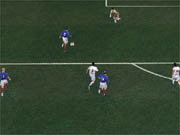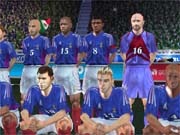It wasn't so very long ago that soccer fans could choose from a variety of PC-based depictions of their favorite sport. Yet as the last few years of the 20th century fluttered by, it became increasingly apparent that one title stood tall above the rest. That game was EA Sports' FIFA Soccer, and today it is virtually the only way to play. With 2002 FIFA World Cup, EA has gone to the well once more, again tweaking its dominant formula just enough to make an already captive audience think hard about reenlisting. Sporting several minor gameplay enhancements and a substantially overhauled presentation that impressively re-creates the global impact of a World Cup event, this edition of FIFA is in many ways the finest edition of FIFA yet. Although it revolves completely around the 2002 Japan/Korea World Cup and as such doesn't deliver the sheer number of players, teams, and league and tournament options of FIFA's regular annual installments, 2002 FIFA World Cup is quite simply one of the most exciting PC sports games ever created.

This is no small accomplishment considering how professionally appointed each previous FIFA has been. Yet when experienced back-to-back with last year's FIFA Soccer 2002--released a scant six months ago--2002 FIFA World Cup is a completely different animal. Starting with the game's dramatic introductory sequence, you'll sense that EA wanted to unleash something new. The usual electronic/dance beats of chart-toppers such as Moby and Ministry of Sound have been exchanged for the powerful strings and crescendos and kettledrums of the critically acclaimed Vancouver Symphony Orchestra. The menu system, which surely reached the peak of drabness in last year's model, is polished, colorful, and presented with pride. The new "everyone's game" component, wherein you can access real-life multimedia snippets concerning most every aspect of this year's World Cup, is especially enjoyable despite its low-grade video quality.
2002 FIFA World Cup presents 20 Japanese and Korean stadiums in all, each a seemingly faithful and certainly brilliantly rendered work of art, and the choice of day or night contests. Interestingly, the game does not offer inclement weather options. When the sides are selected and the go-ahead given, you'll take a dizzying ride from the top of the stadium to pitch level, taking in a profusion of visual treats along the way. Fireworks explode in the sky, laser effects dance all around, and a surging sea of spectators rises and falls as one. EA has adopted a high-contrast color palette for this edition, with greener grass, brighter daylight, darker night skies, punctuated lighting effects, and more vivid kits and thus has made the game look far more vibrant and alive than ever before.

And though this or any other PC soccer game plays far better when viewed from a distant perspective through which general team movement can be more effectively monitored, watching a contest unfold from a tight vantage point has never been so rewarding. EA Sports pioneered the art of duplicating the physical attributes of real-life athletes in game form, yet the FIFA series has always placed a poor second in that respect to other EA franchises, like NHL Hockey. This has changed in 2002 FIFA World Cup, where respective players' faces, heights, and builds now really look different. Players seemingly move more smoothly too, sporting a full range of animations that make even quick actions and maneuvers seem fluid. Postgoal celebrations are really something to behold, particularly after the first score of a contest, where the game speed slows significantly to showcase the frenzied responses of players and crowds alike. Flashbulbs pop, streamers cascade to the ground, and players leap and embrace and dance like never before.
This major atmospheric upgrade is not purely visual. EA has programmed all of its new orchestral music to ebb and flow in conjunction with the latest developments on the pitch. Like a big-budget Spielberg soundtrack, the tones grow dark and deep in tense moments and explosively energetic after goals and victories. Simply awaiting a referee's carding decision gets the heart pumping. Likewise, the assembled throng roars and cheers and engages in rhythmic chanting throughout each game and is always reactive to the latest developments. Back for another stint in the broadcast booth is the ever-compelling John Motsen and the enchantingly annoying Andy Gray, who once again prove that EA's brief stint with American-based ESPN announcers Phil Schoen and Julie Foudy is nothing but a mortifying memory. Certainly from a presentation standpoint, EA has succeeded in elevating the spectacle of the World Cup beyond that of a yearly tourney or league game.
Of course, none of this would mean anything if the gameplay weren't up to par. In 2002 FIFA World Cup, EA has addressed some issues, has added a few twists and turns, and has made the new game noticeably more challenging. Although the game continues to unfold far faster and with less time for thought and planning than the real item and thus will disappoint hard-core footy buffs expecting perfect realism, it has been slowed down a bit and once again retooled just enough to warrant a look.

Above all else, 2002 FIFA World Cup is more difficult than previous FIFA games. Even with aids like automatic crosses activated, passes will often miss their intended recipient. Shots on goal must be precisely targeted and free of excess power lest your players misfire when applying the boot. Speed bursts are particularly interesting this time around, building extremely slowly and never really reaching the level they have in the past. And if either the human or AI-controlled side has been under pressure for an entire match with no signs of extracting itself, players will fatigue and team defenses will crumble even more dramatically as the clock ticks on. In the waning stages of an exceptionally one-sided match, there's a very good chance the score will become more lopsided than it already is.
The air game has also clearly been revamped. Now, you'll decide in advance the power and direction to apply to the ball and let the game handle the area on your player's body that it plans to strike. Whether this is a benefit or a detriment will depend very much on how comfortable you were with headers and volleys of prior editions. Also new to the series is the "star player" system. Although EA Sports has always attempted to mimic the real-life abilities of its numerous players, it has never gone to such lengths to accentuate the difference between a guy like David Beckham and a run-of-the-mill soccer jock. Some may find these truly gifted few to be a little too talented, plowing through defenders and laying out perfectly placed balls with startling ease, but there's little doubt that the absolute top players can often do the same in the real world.
Adding to its already impressive roster of player actions, the newest FIFA also lets you juggle the ball--that is, being able to keep it in the air by bouncing it from one body part to another while running. This is not particularly easy to execute, but anyone who's ever attempted to juggle a ball in real life will tell you that it shouldn't be. A new difficulty level has been added for a total of four, and the top two require an almost complete knowledge of advanced gamepad controls and exactly when to initiate them. Unfortunately, EA has neglected to include a practice mode, a decision that surely won't sit well with FIFA rookies.
Yet old habits die hard, and 2002 FIFA World Cup proves it. Players and player limbs still tend to transpose through one another, an annoying trait that thankfully occurs only rarely. More critically, the gameplay engine still has a penchant for robbing human and AI-controlled teams of sure goals just because it feels that the run of the play doesn't warrant it. Certainly hitting three straight goalposts from inside the penalty spot, two with the keeper completely out of position, wouldn't happen in real life--and it shouldn't happen here, yet it sometimes does. So too does the distinct possibility of double-digit scores. However, it is important to remember that most every aspect of the game, including star-player ability and power-up speed, is completely adjustable. In the end, most anyone but those who pine for the days of a slow, deliberate, and accurate soccer sim should find a pleasant middle ground.

As has become typical for the series, 2002 FIFA World Cup supports virtually every style of multiplayer game. We found that EA's Internet matchmaking service worked flawlessly, sourcing playing partners at virtually any time of the day or night. The game itself ran noticeably slower than single-computer contests but rarely developed jumpiness and was generally quite workable. Sadly, games against other humans proved that the simple technique of shielding the ball, especially with a star player, is far too effective. Several of our opponents cast aside the passing game almost completely in favor of bullying their way straight through several defenders. This simply does not sync well with real life.
With just 40 total sides and several all-star squads that become available if you win a World Cup, 2002 FIFA World Cup does not offer the raw volume of players and teams presented in its standard annual releases. Yet this game concerns itself with quality, not quantity. If the true flavor of a global event of this magnitude appeals to you and you've generally been pleased with prior iterations, you may well find the latest FIFA to be the greatest FIFA to date.